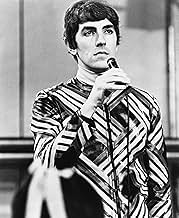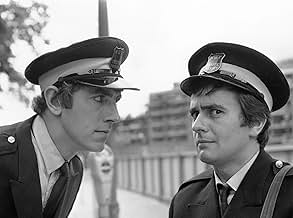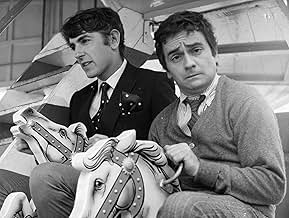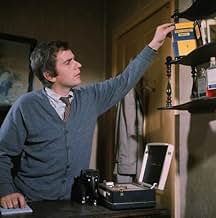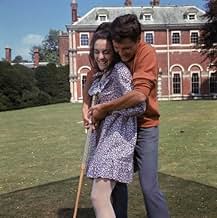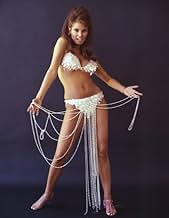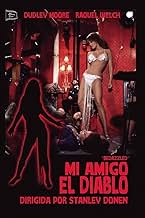AVALIAÇÃO DA IMDb
6,7/10
10 mil
SUA AVALIAÇÃO
Um perdedor infeliz vende a sua alma ao Diabo em troca de sete desejos.Um perdedor infeliz vende a sua alma ao Diabo em troca de sete desejos.Um perdedor infeliz vende a sua alma ao Diabo em troca de sete desejos.
Danièle Noël
- Avarice
- (as Daniele Noel)
Avaliações em destaque
I did have high expectations going into this film, being a fan of Cook and Moore through what is available of "Not Only But Also", and several other Cook projects like the superb collaboration with Chris Morris, "Why Bother?" The expectations were largely fulfilled when I got to see this film, via a rare showing on Channel 4 this last April, as a tribute to Dudley Moore. The remake with Liz Hurley in place of Cook (how crass and thoughtless a piece of casting? They should really have discarded the title "Bedazzled" and just made it a Faust update, and not made any association with the Pete n' Dud film) is of course an irrelevance, and it is truly emblematic of our culture that it has received so many more IMDb votes than this original.
This film succeeds where "The Hound of the Baskervilles", a later Cook-Moore vehicle, abysmally fails. "Bedazzled" contains the essence of their comedic appeal, rooted as it is in errant taboo-breaking and gleeful absurdism. The strong guiding influence of Cook is in the script, which he had strong control over, by all accounts. The concept is a modern spin on the Faustian legend, based in 1960s London (amongst diversions!). "Bedazzled", with this scenario and its effective portrayal, is thus most winning when compared to both concept and execution in "The Hound of the Baskervilles"' lamentable case.
We have Pete n' Dud centre stage, and both at their comedic peak. Moore as a hapless, beleaguered little chap, and Cook as a matter-of-fact, mischievous, cunning and charming devil. A devil called Mr George Spiggott, bizarrely! :-) The other turns are good, and merely complementary, with the various sins portrayed pretty well. Eleanor Bron is reasonable as the malleable (according to the wishes) but essentially quite undeveloped love interest of Moore's. Not that this particularly matters in a comedy such as this; and her hair is eye catching. :-)
The brazenly literal cameo from Raquel Welch is something of a scream I must say; no pretence at her being anything else, which I presume there has been in other Welch movies of the period.
The various segments in this episodic film, are perhaps variable in their quality, but none are poor. The episodic nature of the film really does work in its favour keeping it fresh, but having the wonderful London linking sequences the heart of the film. It gets most amusing as Cook's devil repeatedly outwits Moore and finds loopholes in his wishes to downright exploit. The "happy family and home life" wish is really quite bizarre and almost disturbing in its oddness, while maybe the "rich" one slightly overdoes Bron's bumptious ultra-sexuality, even if the whole segment works very well. The "leaping nuns" part is prime "Not Only But Also" in its hushed absurdity and is a joy. The art direction and music aspects are notably good, embellishing the film and drawing out its sixties context. This film has not and can not date, as it is all so tastefully achieved and its technical grasp never exceeds its reach.
The whole film I feel, works excellently, with dashes of irony and an effective restating of the Faustian morals. There is an engaging melancholy to this film, below its comedic surface. The scene of the old woman being fobbed off by Cook is briefly poignant and suggestive of a whole society's delusion. The scenes as Cook effectively knocks on the door of Heaven feel slightly sombre to me, as well as oddly comic. There are some quite thoughtful scenes of dialogue as well, with the droll Cook in his element, perched atop a postbox. Of course, the depressing outcomes of each wish for Moore's character, only add to the slightly prickly, problematic mood that underlies the film. The whole thing ends on a very apposite note, I should add with a glint in my eye.
I loved watching this film, and while I doubt it could quite be labelled a fully-formed "masterpiece", it is a startlingly good evocation of the 1960s in a way... and also very much an amusing, clever comedy, with the subversive spirit of Peter Cook stamped all over it.
This film succeeds where "The Hound of the Baskervilles", a later Cook-Moore vehicle, abysmally fails. "Bedazzled" contains the essence of their comedic appeal, rooted as it is in errant taboo-breaking and gleeful absurdism. The strong guiding influence of Cook is in the script, which he had strong control over, by all accounts. The concept is a modern spin on the Faustian legend, based in 1960s London (amongst diversions!). "Bedazzled", with this scenario and its effective portrayal, is thus most winning when compared to both concept and execution in "The Hound of the Baskervilles"' lamentable case.
We have Pete n' Dud centre stage, and both at their comedic peak. Moore as a hapless, beleaguered little chap, and Cook as a matter-of-fact, mischievous, cunning and charming devil. A devil called Mr George Spiggott, bizarrely! :-) The other turns are good, and merely complementary, with the various sins portrayed pretty well. Eleanor Bron is reasonable as the malleable (according to the wishes) but essentially quite undeveloped love interest of Moore's. Not that this particularly matters in a comedy such as this; and her hair is eye catching. :-)
The brazenly literal cameo from Raquel Welch is something of a scream I must say; no pretence at her being anything else, which I presume there has been in other Welch movies of the period.
The various segments in this episodic film, are perhaps variable in their quality, but none are poor. The episodic nature of the film really does work in its favour keeping it fresh, but having the wonderful London linking sequences the heart of the film. It gets most amusing as Cook's devil repeatedly outwits Moore and finds loopholes in his wishes to downright exploit. The "happy family and home life" wish is really quite bizarre and almost disturbing in its oddness, while maybe the "rich" one slightly overdoes Bron's bumptious ultra-sexuality, even if the whole segment works very well. The "leaping nuns" part is prime "Not Only But Also" in its hushed absurdity and is a joy. The art direction and music aspects are notably good, embellishing the film and drawing out its sixties context. This film has not and can not date, as it is all so tastefully achieved and its technical grasp never exceeds its reach.
The whole film I feel, works excellently, with dashes of irony and an effective restating of the Faustian morals. There is an engaging melancholy to this film, below its comedic surface. The scene of the old woman being fobbed off by Cook is briefly poignant and suggestive of a whole society's delusion. The scenes as Cook effectively knocks on the door of Heaven feel slightly sombre to me, as well as oddly comic. There are some quite thoughtful scenes of dialogue as well, with the droll Cook in his element, perched atop a postbox. Of course, the depressing outcomes of each wish for Moore's character, only add to the slightly prickly, problematic mood that underlies the film. The whole thing ends on a very apposite note, I should add with a glint in my eye.
I loved watching this film, and while I doubt it could quite be labelled a fully-formed "masterpiece", it is a startlingly good evocation of the 1960s in a way... and also very much an amusing, clever comedy, with the subversive spirit of Peter Cook stamped all over it.
Cooke and Moore were possibly the finest comedians the UK has ever produced before Python and others followed Pete and Dud were the undisputed kings of the new cutting edge of comedy/satire in the UK.
But always just under the surface (and later out in the open) there was a sadness and dis-satisfaction to both Peter Cooke and Dudley Moore and I think some of that shows up in this film. Think of the old lady taken for all her money by the Devil and the cheery goodbye she still manages. Also part of the film seems to be dealing with the moral flexibility of people given their circumstance.
Stanley Moon (Moore) has limited opportunities as a short order cook all he desires is the love of Margaret one of the waitresses at the Wimpy he works in. But he is a good person, when after a botched suicide attempt he sells his soul to the devil (Cooke) he has all the opportunities in the world but it is easier for the devil to corrupt him.
Throughout the seven wishes (in accordance with 7 the mystic number, 7 days of the week, 7 deadly sins, 7 brides for 7 brothers..)Stanley can only think of his own needs and perhaps this is why they fail to make him happy. On his one opportunity to give a wish away to stop one of the devils petty tricks (sending a swarm of bee's to harass some flower children) he refuses saying 'Their mine and iv'e only got four left!' The other main theme of this film is more to the forefront dealing with Cooke and Moores attitudes towards religion and it's place in what at the time was the modern world. People were beginning to come away from the church and for the first time non-believers were becoming the majority. Part of the film lampoons religion particularly the bouncing nuns, but at the end it's god who wins out over the devil all be it by a technicality. In a way they showed the obvious contradictions and flaws in the Christian faith - religion nice idea but surely it cant be that way? If all of the above makes this film sound heavy going be assured it's not, and where as in others hands it may have become a pretentious mess it becomes a light hearted very funny comedy romp. If you just want a laugh on a Saturday night this will provide it, if you want to look deeper in and start divining meaning from every little aspect you can it's that sort of film.
Highly recommended 9/10 NOTE - AVOID THE REMAKE LIKE THE PLAGUE IT'S Awful
But always just under the surface (and later out in the open) there was a sadness and dis-satisfaction to both Peter Cooke and Dudley Moore and I think some of that shows up in this film. Think of the old lady taken for all her money by the Devil and the cheery goodbye she still manages. Also part of the film seems to be dealing with the moral flexibility of people given their circumstance.
Stanley Moon (Moore) has limited opportunities as a short order cook all he desires is the love of Margaret one of the waitresses at the Wimpy he works in. But he is a good person, when after a botched suicide attempt he sells his soul to the devil (Cooke) he has all the opportunities in the world but it is easier for the devil to corrupt him.
Throughout the seven wishes (in accordance with 7 the mystic number, 7 days of the week, 7 deadly sins, 7 brides for 7 brothers..)Stanley can only think of his own needs and perhaps this is why they fail to make him happy. On his one opportunity to give a wish away to stop one of the devils petty tricks (sending a swarm of bee's to harass some flower children) he refuses saying 'Their mine and iv'e only got four left!' The other main theme of this film is more to the forefront dealing with Cooke and Moores attitudes towards religion and it's place in what at the time was the modern world. People were beginning to come away from the church and for the first time non-believers were becoming the majority. Part of the film lampoons religion particularly the bouncing nuns, but at the end it's god who wins out over the devil all be it by a technicality. In a way they showed the obvious contradictions and flaws in the Christian faith - religion nice idea but surely it cant be that way? If all of the above makes this film sound heavy going be assured it's not, and where as in others hands it may have become a pretentious mess it becomes a light hearted very funny comedy romp. If you just want a laugh on a Saturday night this will provide it, if you want to look deeper in and start divining meaning from every little aspect you can it's that sort of film.
Highly recommended 9/10 NOTE - AVOID THE REMAKE LIKE THE PLAGUE IT'S Awful
If you have seen the Brendon Frazer / Liz Hurley version of "Bedazzled" I beg of you to check out the original version. Peter Cook and Dudley Moore, an already famous comedy team brought their expertise to this film, a reworking of the Faust legend.
Moore plays Stanley Moon, a grill cook at the Whimpy Burger, who is in love with Margaret Spencer (Eleanor Bron), a waitress there. When his attempt to go and ask for a date is thrarted by his own hesitation, he decides to end it all.
Enter George Spiggot a.k.a. The Devil (Peter Cook) who tells Stanley that he can be with Margaret, in exchange for his soul. Stanley agrees, and the rest of the film showcases Stanley's wishes and that there is no such thing as a sure thing.
The chemistry between Cook and Moore shows through as their script demonstrates. Bron is wonderful as Margaret, and Stanley Donen's direction only accents the well written script.
The only other big name in the supporting cast, Raquel Welch, projects sheer sexuality as Lilian Lust, the sexpot of the Seven Deadly Sins.
Concerning the remake, I wish it were more like the plotline of the original, because I think that Liz Hurley would have made a terrific Lilian Lust. Watch the two versions and you'll see.
All in all, you can't go wrong with the original. Check it out and enjoy.
P.S. Julie Andrews!!!!!!!!!!!!
Moore plays Stanley Moon, a grill cook at the Whimpy Burger, who is in love with Margaret Spencer (Eleanor Bron), a waitress there. When his attempt to go and ask for a date is thrarted by his own hesitation, he decides to end it all.
Enter George Spiggot a.k.a. The Devil (Peter Cook) who tells Stanley that he can be with Margaret, in exchange for his soul. Stanley agrees, and the rest of the film showcases Stanley's wishes and that there is no such thing as a sure thing.
The chemistry between Cook and Moore shows through as their script demonstrates. Bron is wonderful as Margaret, and Stanley Donen's direction only accents the well written script.
The only other big name in the supporting cast, Raquel Welch, projects sheer sexuality as Lilian Lust, the sexpot of the Seven Deadly Sins.
Concerning the remake, I wish it were more like the plotline of the original, because I think that Liz Hurley would have made a terrific Lilian Lust. Watch the two versions and you'll see.
All in all, you can't go wrong with the original. Check it out and enjoy.
P.S. Julie Andrews!!!!!!!!!!!!
Just watched it again and this time I get it. Thirty-four years ago the script was over my head and I missed most of the double entendres. 1967 was a great
year for them as censorship had just been slackened. The pop star sequence is in fuzzy black and white because it's supposed to be on TV - yes, that's what it used to look like. (Did people really dance like that?)
The script is brilliant but sometimes the delivery is so throw-away the jokes are missed. Maybe as Peter Cook wrote them he didn't think they needed
underlining. For example, when Stanley borrows George's red nightshirt and
says something like "Does it really suit me? Red's not my colour, I'm usually more conservative." Red for socialism, blue for the conservative party. George's red socks were sported by Labour voters well into the conservative 70s and
80s.
Little things you may not know: Victorian nightshirts and long-legged bathing suits were a fad in 1967. George and Stanley when being themselves speak in
working class accents (unlike God). Dudley really was working class, unlike
Peter Cook.
RIP to both. Let's eat a bowl of raspberries and cream in their memories. xxxxxxxxxxx
year for them as censorship had just been slackened. The pop star sequence is in fuzzy black and white because it's supposed to be on TV - yes, that's what it used to look like. (Did people really dance like that?)
The script is brilliant but sometimes the delivery is so throw-away the jokes are missed. Maybe as Peter Cook wrote them he didn't think they needed
underlining. For example, when Stanley borrows George's red nightshirt and
says something like "Does it really suit me? Red's not my colour, I'm usually more conservative." Red for socialism, blue for the conservative party. George's red socks were sported by Labour voters well into the conservative 70s and
80s.
Little things you may not know: Victorian nightshirts and long-legged bathing suits were a fad in 1967. George and Stanley when being themselves speak in
working class accents (unlike God). Dudley really was working class, unlike
Peter Cook.
RIP to both. Let's eat a bowl of raspberries and cream in their memories. xxxxxxxxxxx
A hapless loser (Dudley Moore) sells his soul to the Devil (Peter Cook) in exchange for seven wishes, but has trouble winning over the girl of his dreams (Eleanor Bron).
An extremely influential figure in modern British comedy, Cook is regarded as the leading light of the British satire boom of the 1960s. He was closely associated with the anti-establishment comedy that emerged in Britain and the United States in the late 1950s.
Others have said Cook (and this film) are sort of a precursor to Monty Python, and I can see that. The mocking of religion is there, especially with the nuns on trampolines. The film does seem to run a bit long and get stale in places, but as a whole it is a breath of fresh air, a piece of film history ushering in a new era of comedy.
An extremely influential figure in modern British comedy, Cook is regarded as the leading light of the British satire boom of the 1960s. He was closely associated with the anti-establishment comedy that emerged in Britain and the United States in the late 1950s.
Others have said Cook (and this film) are sort of a precursor to Monty Python, and I can see that. The mocking of religion is there, especially with the nuns on trampolines. The film does seem to run a bit long and get stale in places, but as a whole it is a breath of fresh air, a piece of film history ushering in a new era of comedy.
Você sabia?
- CuriosidadesAlthough Raquel Welch is featured in most of the promotional material for this movie, she is on-screen for only roughly seven minutes.
- Erros de gravação(at around 55 mins) During Dudley Moore's song "Love Me", which he sings in character as Stanley Moon, the woman to the right of the screen seems to say repeatedly "Oh, Dudley" instead of calling him by his character's name, "Stanley".
- Citações
George Spiggott: Everything I've ever told you has been a lie. Including that.
Stanley Moon: Including what?
George Spiggott: That everything I've ever told has been a lie. That's not true.
Stanley Moon: I don't know WHAT to believe.
George Spiggott: Not me, Stanley, believe me!
- ConexõesFeatured in Film Review: Peter Cook, Dudley Moore & Stanley Donen (1967)
Principais escolhas
Faça login para avaliar e ver a lista de recomendações personalizadas
- How long is Bedazzled?Fornecido pela Alexa
Detalhes
Bilheteria
- Orçamento
- US$ 600.000 (estimativa)
- Tempo de duração1 hora 43 minutos
- Cor
- Proporção
- 2.35 : 1
Contribua para esta página
Sugerir uma alteração ou adicionar conteúdo ausente



